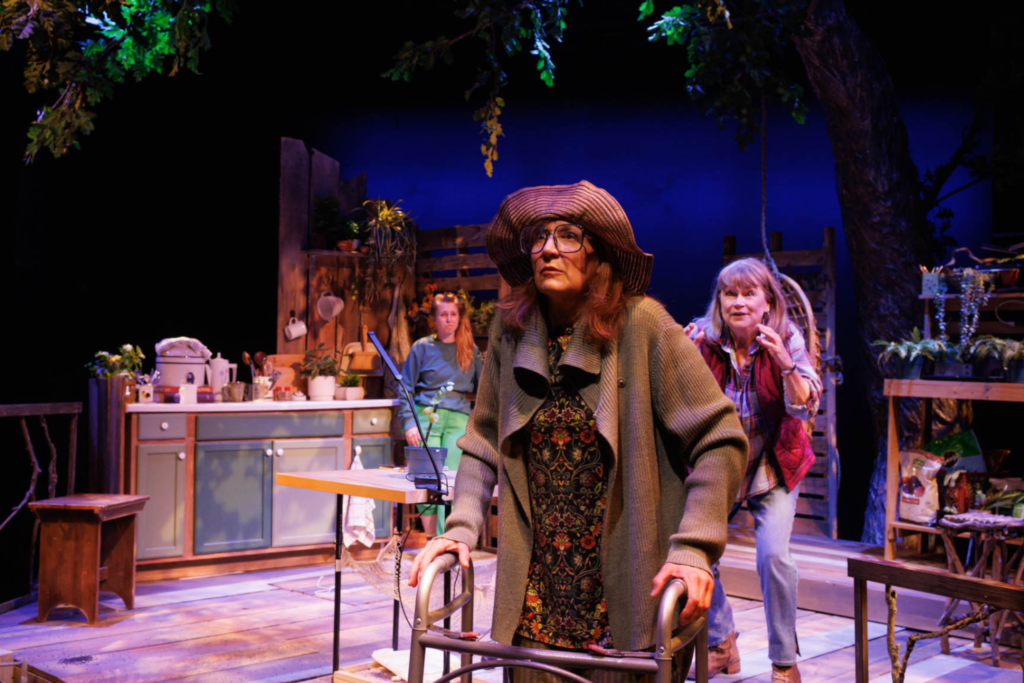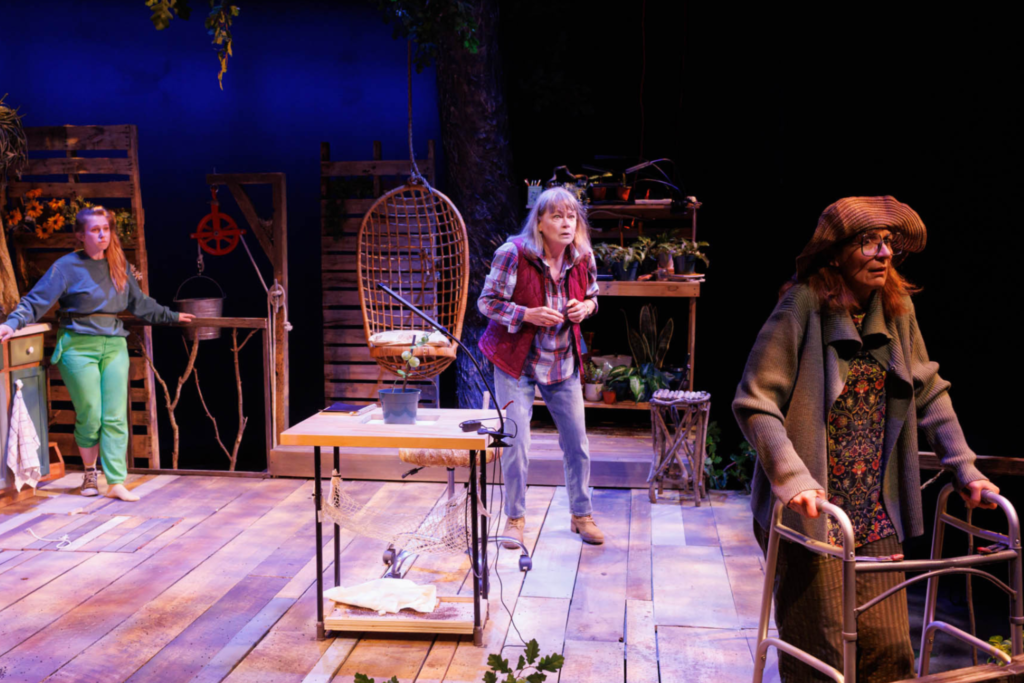
Photo by Ken Yotsukura Photography.
Presented by The Lyric Stage Company
By Deborah Zoe Laufer
Directed by Courtney O’Connor
Composer & sound design: Dewey Dellay
Featuring Karen MacDonald, Lisa Tucker, and Katherine Callaway
June 2 – 25, 2023
The Lyric Stage Company
140 Clarendon Street, 2nd Floor
Boston MA, 02116
Critique by Maegan Bergeron-Clearwood
BOSTON, Mass. — Rooted makes a breathless first impression. Walking into the theater at The Lyric Stage Company, perhaps for the first time since I’ve started attending theater post-lockdown, I literally gasped at the sight: part treehouse deck, part overgrown garden, all shrouded in dappled shade from the foundational tree’s outstretched limb.
The set, designed by Janie E. Howland, is as much a character in Deb Zoe Laufer’s play as its protagonist, Emery (Lisa Tucker). Emery has sequestered herself to her treehouse sanctuary for 12 years by the start of the play, with only two connections to the world below: her caregiver sister, Hazel (Karen MacDonald), and her unexpectedly popular YouTube channel showcasing her plant experiments. Her compassionate, charismatic way with plants inspires her online fans to form a literal cult around her beloved tree.
Hazel and Emery’s relationship is the supposed dramatic crux of the play, but it quickly becomes clear that they are not interacting on an even playing field. Emery has a physical disability, and she is heavily coded as neurodivergent, possibly autistic (my autistic plus-one friend read her directly as such, which I could also see, and we discussed how rare and refreshing it was to see a middle-aged woman in such a role). Her connection with plants and aversion to crowds is not treated as a joke on Laufer’s part; Emery’s little world at the top of her tree is vibrant and valid, rather than quirky or weird.
The scariest element of Rooted, for me, was not Emery’s accidental Internet cult, but the exploitation on the part of her sister, who sees Emery’s fame as a ticket to wealth and adventure and stokes the cult’s fire without Emery’s consent. As Hazel continued escalating the situation, proving herself to be near-irredeemably cruel at times, I saw the play as an eerie reminder of how caregiving relationships can become innocuously abusive.
The unevenness of the sisters’ dynamic was depressingly realistic, but it sometimes derailed the dramatic momentum of the play: Hazel, due to her position of control, drove most of the plot, whereas Emery’s more internal journey made her seem passive in comparison, and I wish the play did more to empower Hazel and hold her abusive sister accountable.
Still, Emery’s journey towards self-acceptance is the heart of Rooted, emphasized by enchanting elements of magical realism and her burgeoning relationship with a bright-eyed cult member, Luanne Cooper (a heart-tugging Katherine Callaway, whose chemistry with Tucker propels much of the latter half of the play). Cooper is much younger than Emery, but her own experiences with classism, social anxiety, and neurodivergence (she takes stimulants, presumably for ADHD) prime her for an empathetic connection with Emery, who is at times frozen by her own internalized shame.
Cooper’s unwavering sweetness revealed one of the play’s weaker points, however, which is its strangely apolitical representation of cults. Rooted is much more interested in comedy and metaphor than in realism, so I was able to suspend my disbelief when it came to the logistics of the cult, which seemed to sprout up overnight and had few of the characteristics of an actual cult, such as isolation from society at the hands of a narcissistic, intentionally manipulative leader.

Cooper and her fellow cultists desire purpose and connection in an increasingly alienating world, illuminating Laufer’s reasoning for using cults as a broader dramatic metaphor. What broke this reasoning for me was when Cooper admitted to being a climate change-denier – from that point on, I was unable to distance Laufer’s quirky fictional cult from the utterly dangerous, and political, cults of reality. Cooper’s youthful, small-town innocence shields her from criticism within the play itself, but I think there’s something potentially dangerous in whitewashing such a character.<
In the “real world,” climate change deniability cannot be divorced from other harmful political beliefs, especially white supremacy. Rooted lightly addresses issues of gender, disability, and class, but seems surreally uninterested in acknowledging the violent underpinnings of its central metaphor. The play puts up a front of apoliticism behind the false neutrality of its white characters – its world exists in a kind of privileged ideological treehouse, high above the messy reality below.
Cult metaphor aside, Rooted succeeds in showing that purpose and connection are worthwhile pursuits, and that they look different for different people. Within a capitalist, ableist framework, Emery is not a conventionally successful person, so it is refreshing to witness her uniquely Emery-esque perspective, passions, and desires uplifted rather than shamed.
It is also refreshing to experience a production that is so alive, so inherently and exuberantly theatrical: Rooted transported me to a world of Emery’s own making, and I’m grateful to have spent an afternoon with her.
